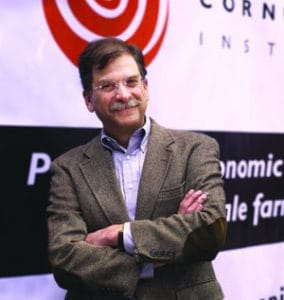Cornucopia’s Take: Organic producers meet regularly in communities, conferences, and online to share stories and seek solutions to the growing crisis in the organic marketplace. As outlined in the article below, there are now two organics: life-affirming agricultural practices adhering to the spirit and letter of organic regulations and industrial-scale production methods, based on conventional farming, substituting organic inputs for toxic synthetics. When consumers buy organic from true organic farmers, they are absolutely getting what they pay for. Cornucopia’s scorecards can help consumers identify those products coming from true organic farmers.
Krupp: Organic Standards Debate
VPR
by Ron Krupp
 |
Mark Kastel is the co-director of the organic advocacy non-profit, Cornucopia, and Mark says we’re seeing the rise of two definitions of organic.
One is promulgated by big corporations, with weaker standards and potentially suspect ingredients – all facilitated by a compliant USDA and largely cloaked in secrecy. The other is practiced by local farmers and a group of still independently owned brands following the spirit and letter of founding organic precepts.
The rise of cheap organic grain imports has resulted in estimated losses exceeding two hundred and fifty million dollars for American grain farmers. The USDA’s National Organic Program is also allowing the certification of hydroponic fruits and vegetables grown without soil. These new regulations go against the environmental and health benefits that underpin organic farming to accommodate cheaper, industrial methods that grow food in containers using liquid fertilizers made from soy in sealed warehouses under artificial lighting.
Organic advocates have worked for the last seven years to improve organic animal welfare standards, but a related proposed new rule was withdrawn by the USDA in response to concerns raised by giant confinement egg production operations – some with barns holding 200,000 birds. In other cases related to livestock, delays in rules denying livestock outdoor access have been challenged by organic advocates.
Since last July there have been 15 Rallies to Protect Organic – including one held in the Upper Valley – and from Maine to California, these rallies demonstrate a growing and widespread discontent with the failures of the National Organic Program.
The central theme of these Rallies has been to honor healthy soil as the essential foundation of organic farming. The one in the Upper Valley was organized by NOFA Vermont and Dave Chapman, an organic greenhouse tomato grower from East Thetford and for many years a leader in the effort to “keep the soul in organic” along with Elliot Coleman, an elder statesmen and former Vermont farmer. Coleman warns that “We are in danger of losing 50 years of hard fought gains in the healthy soil movement. We refuse to let the promise of organic agriculture be compromised by profiteers.”
I’ve been an organic grower for more than forty years and it’s clear to me that the organic movement is in danger of being whittled down by radical capitalism in service to corporate agriculture.
But fortunately, the movement will not just silently march along.

